It seems that the best beauty products are always in front of you—or at least in your kitchen cabinet. Apple cider vinegar has been a leader in skincare and wellness for some time now, serving as a detoxifier, weight loss aid, and even acne treatment. If that wasn’t enough, ACV is now famous in hair care, which should come as no surprise considering its versatility and the fact that it’s a killer DIY shampoo. In this blog post, we’ll discuss the benefits of using it as a shampoo, how to use it, and who shouldn’t.
What Is Apple Cider Vinegar?

Apple cider vinegar is made by crushing apples and then squeezing out the juice. Bacteria and yeast are added to the liquid to start the alcoholic fermentation process, which converts the sugars from the juice to alcohol. Then in the second and final fermentation step, the alcohol is converted into vinegar.
Benefits Of Apple Cider Vinegar For Hair
1. Balance and soothe your scalp
Hair, like everything else, has a natural pH range—that is, a certain level of acidity or alkalinity—to keep it healthy. When it goes beyond that, you’ll notice a difference in the look and feel of your strands due to your environment, product use, style, or any other external force.
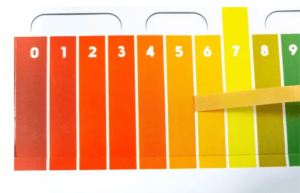
The normal pH of the scalp is 5.5 and the hair shaft is 3.5. Alkaline shampoos and conditioners can disrupt your hair’s pH balance, leading to more pores and frizz. And ACV, which has a pH of 2 to 3, rebalances our pH, closes open cuticles, reduces hair porosity, and makes our hair stronger and shinier.
2. Remove hair care product buildup
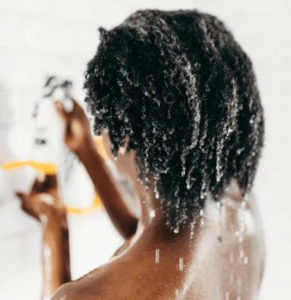
Because apple cider vinegar is more acidic than most regular shampoos, it helps exfoliate dead skin cells and wash away buildup in hard water and hair care products like dry shampoos. After using an ACV product, you’ll discover how easy it is for shampoo to lather in your hair. Your hair care products are also able to be more effective because the buildup is dealt with.
3. Have an antibacterial effect
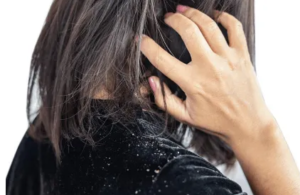
Your scalp is a host to some bacterial and fungal friends—many of which are harmless—but sometimes they can get a little too comfortable, leading to less interesting side effects like itching and dandruff. ACV can help balance a dry and itchy scalp by helping to control bacteria or fungi that can cause scalp and hair problems.
4. Replenished with your favorite clarifying shampoos
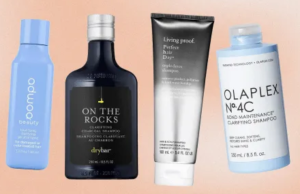
ACV can help reduce excess natural oils at the roots, making it ideal for those with oily or fine hair. Even better, it’s gentler than most clarifying shampoos, so you can use it more than once a week. You can and in most cases should use it every time you wash your hair to balance pH, close the cuticle and restore the surface and shine of your hair.
5. Reduce hair loss and repair breakage

Since ACV balances the pH of our scalp and effectively clears inflammation within the hair follicles, this ingredient reduces hair loss in general. Over time, apple cider vinegar is strengthening our hair strands and brings more balance to our scalp, so it puts less pressure on the area.
Instructions For People Inapplicable For ACV
People who are not recommended to use apple cider vinegar:
♦ People with sensitive skin.
♦ People with cuts or abrasions on the scalp.
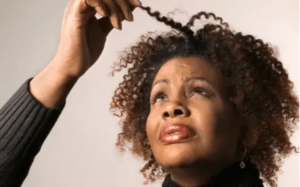
♦ Brittle or dry hair (unless followed by a deep conditioning treatment.)
♦ People with permanently colored or colored hair: Apple cider vinegar may make colored hair (or colored hair) feel drier or brittle. If you rinse with apple cider vinegar, you should replace your hair’s natural oils with a deep conditioner.
♦ People who are sensitive or allergic to apples or apple cider vinegar: Hair is not penetrating enough to absorb ACV into your system, but the pores of your skin are.
♦ When used undiluted: We couldn’t say more—don’t use full-strength ACV as it may burn or irritate the scalp.
How To Use Apple Cider Vinegar For Hair

Because ACV is slightly acidic, it may extend the life of hair color when it is mixed with two to three parts water, but only use it immediately after the color has been rinsed off. Most hair colors are alkaline, which opens up the hair cuticle, which may be resealed with an acidic solution. You can try to find the best thinner for you and your hair type, but in general, the following steps are a good guide:
♦ Shampoo and condition hair normally.
♦ Mix five parts water to one part vinegar (100ml ACV and 500ml water if you want to be exact) in a spray bottle. Spray the scalp well enough to spread evenly.

♦ Work the vinegar into clean hair with your fingers, making sure to distribute it evenly. Let the vinegar mixture sit on your hair for two to five minutes.
♦ Rinse hair and scalp with cold water. Use a light conditioner for this rinse. Rinse your hair well until you’re sure all the product (and vinegar) has been removed.
FAQs About ACV Hair Rinse
1. What is the difference between ACV and clarifying shampoo?
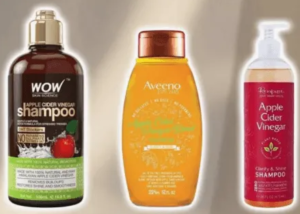
Clarifying shampoos are formulated to remove product build-up and excess oil and prepare hair for certain types of color or hair treatments. However, when used alone, it can fade and make hair feel dry and dull, so follow up with a good conditioner or the necessary accompanying treatment. ACV, on the other hand, is designed to remove buildup, seal hair color, and enhance shine.
2. Are there any side effects from using ACV shampoo?
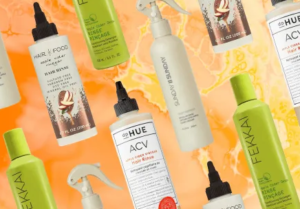
The frequency of use depends on the individual and their hair type, but too much can cause brassiness and damage. For most people, using ACV shampoo a few times a week won’t damage your hair color, but if your skin becomes sensitive after use, you should use it less often.
3. Will my hair smell weird if I treat it with apple cider vinegar?
After the ACV rinse, the hair should not leave any odor after the drying treatment.
Conclusion

Apple cider vinegar has many benefits for hair and scalp that can be done in the comfort of your own home. However, it should be used with caution as it can irritate if not diluted properly. Discontinue use if any side effects occur. If you have any questions, please leave a comment below the article!



